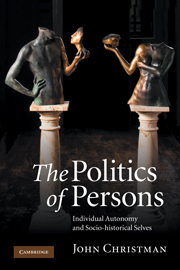2 - The social conception of the self: a critical taxonomy
Published online by Cambridge University Press: 15 December 2009
Summary
After several decades of discussion of identity politics, multiculturalism, and communitarian challenges to liberalism, it has become a commonplace to acknowledge that citizens harbor identities and formulate values based in part on their membership in larger social groups. Whatever particular account is given of the relationship between social identities and principles of justice, it is everywhere admitted that a conception of the citizen as entirely unconnected to social practices and categories, cultural traditions, and other marks of identity will be insufficient to gain legitimacy in the contemporary context. The age of classic individualism, at least in its unwashed form, is behind us.
The communitarian critique of liberalism discussed so protractedly in the 1980s and 1990s has now morphed into the challenge posed by identity-based movements and cultural claims, which has caused liberal models of autonomy to become more sensitive to this social conception of the self. So, this is admittedly well-trod ground. But the conception of autonomy defined and defended in the chapters to follow will need to be set against the backdrop of the many dimensions of the social and historical “self” that can plausibly be postulated. The standard liberal responses to the challenges built on such postulations have not adequately surveyed the many different ways that selves can be considered “social.” This has caused more than a little cross-talk among liberal apologists and their anti-liberal critics.
- Type
- Chapter
- Information
- The Politics of PersonsIndividual Autonomy and Socio-historical Selves, pp. 21 - 47Publisher: Cambridge University PressPrint publication year: 2009



